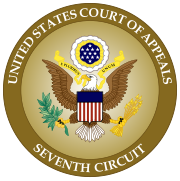Loading AI tools
Antipornography judgment From Wikipedia, the free encyclopedia
American Booksellers Ass'n, Inc. v. Hudnut, 771 F.2d 323 (7th Cir. 1985),[1] aff'd mem., 475 U.S. 1001 (1986), was a 1985 court case that successfully challenged the constitutionality of the Antipornography Civil Rights Ordinance, as enacted in Indianapolis, Indiana the previous year.
| American Booksellers Ass'n, Inc. v. Hudnut | |
|---|---|
 | |
| Court | United States Court of Appeals for the Seventh Circuit |
| Full case name | American Booksellers Association, Inc. v. William H. Hudnut, Mayor of Indianapolis |
| Argued | June 4, 1985 |
| Decided | August 27, 1985 |
| Citation | 771 F.2d 323 |
| Case history | |
| Prior history | 598 F. Supp. 1316 (S.D. Ind. 1984) |
| Subsequent history | Rehearing and rehearing en banc denied, Sept. 20, 1985; aff'd mem., 475 U.S. 1001; fees awarded on remand, 650 F. Supp. 324 (S.D. Ind. 1986) |
| Court membership | |
| Judges sitting | Richard Dickson Cudahy, Frank H. Easterbrook, Luther Merritt Swygert |
| Case opinions | |
| Majority | Easterbrook, joined by Cudahy |
| Concurrence | Swygert |
| Laws applied | |
| First Amendment | |
Indianapolis enacted an ordinance drafted by Catharine MacKinnon and Andrea Dworkin[2] in 1984 defining "pornography" as a practice that discriminates against women. "Pornography" under the ordinance was "the graphic sexually explicit subordination of women, whether in pictures or in words, that also includes one or more of the following:
The statute provides that the "use of men, children, or transsexuals in the place of women in paragraphs (1) through (6) above shall also constitute pornography under this section".[3]
The case was first heard by the United States District Court for the Southern District of Indiana, which declared the ordinance unconstitutional.[4] Petitioners appealed the case to the United States Court of Appeals for the Seventh Circuit.
Judge Easterbrook, writing for the court, held that the ordinance's definition and prohibition of "pornography" was unconstitutional.[5] The ordinance did not refer to the prurient interest, as required of obscenity statutes by the Supreme Court in Miller v. California, 413 U.S. 15 (1973).[6] Rather, the ordinance defined pornography by reference to its portrayal of women, which the court held was unconstitutional, as "the First Amendment means that government has no power to restrict expression because of its message [or] its ideas."[7]
Seamless Wikipedia browsing. On steroids.
Every time you click a link to Wikipedia, Wiktionary or Wikiquote in your browser's search results, it will show the modern Wikiwand interface.
Wikiwand extension is a five stars, simple, with minimum permission required to keep your browsing private, safe and transparent.